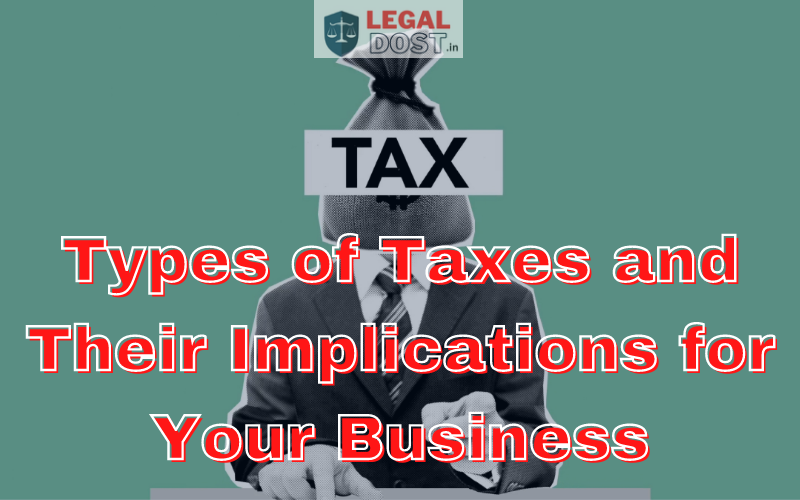Are you a business owner in India looking to understand the different types of taxes you need to pay? Look no further! In this post, we’ll go over the various types of taxes that businesses in India are required to pay, along with their implications for your business.
Corporate Tax
Corporate tax is a tax levied on the profits earned by companies. In India, the corporate tax rate is 22% for domestic companies and 40% for foreign companies.
Implications for Your Business: The corporate tax rate can impact the profitability of your business. A higher rate means less profit for you, while a lower rate means more profit.
The corporate tax rate can also affect the competitiveness of your business. A lower rate may make your business more attractive to investors and customers, while a higher rate may make it less appealing.
Value Added Tax (VAT)
Value Added Tax (VAT) is a tax on the sale of goods and services. In India, the VAT rate varies from state to state, with the average rate being around 14%.
Implications for Your Business:
- VAT is a tax that is passed on to the consumer, so it’s important to consider the impact it will have on the price of your goods or services.
- VAT is calculated based on the value added at each stage of the production process, so it’s important to keep track of your inputs and outputs in order to accurately calculate the tax.
- VAT is a compliance-intensive tax, so it’s important to have systems in place to ensure that you are accurately calculating and paying the tax.
Income Tax
Income tax is a tax on the income earned by individuals and businesses. In India, the income tax rate varies based on the amount of income earned, with higher earners paying a higher rate.
Implications for Your Business:
- Income tax is a significant expense for businesses, so it’s important to plan ahead and set aside funds to cover this expense.
- The income tax rate can impact the profitability of your business. A higher rate means less profit for you, while a lower rate means more profit.
Goods and Services Tax (GST)
Goods and Services Tax (GST) is a value-added tax that is levied on the supply of goods and services. In India, the GST rate varies based on the type of goods or services being supplied, with rates ranging from 0% to 28%.
Implications for Your Business:
- GST is a compliance-intensive tax, so it’s important to have systems in place to ensure that you are accurately calculating and paying the tax.
- GST is a tax that is passed on to the consumer, so it’s important to consider the impact it will have on the price of your goods or services.
- GST is a destination-based tax, meaning that it is levied on the place where the goods or services are consumed. This can impact your business if you are selling goods or services to customers in different states.
Professional Tax
Professional tax is a tax levied on professionals, such as doctors, lawyers, and chartered accountants. In India, the professional tax rate varies from state to state, with the average rate being around INR 200-2500 per year.
Implications for Your Business:
- If you are a professional running your own business, you will be required to pay professional tax.
- Professional tax is a compliance-intensive tax, so it’s important
- to have systems in place to ensure that you are accurately paying the tax.
- Professional tax is an additional expense for your business, so it’s important to factor it into your budgeting and financial planning.
Excise Duty
Excise duty is a tax levied on the manufacture of certain goods, such as alcoholic beverages and tobacco products. In India, the excise duty rate varies based on the type of goods being manufactured, with rates ranging from 10% to 120%.
Implications for Your Business:
- If your business manufactures goods that are subject to excise duty, you will be required to pay this tax.
- Excise duty is a compliance-intensive tax, so it’s important to have systems in place to ensure that you are accurately calculating and paying the tax.
- Excise duty can impact the price of your goods, as it is passed on to the consumer.
Customs Duty
Customs duty is a tax levied on the import or export of goods. In India, the customs duty rate varies based on the type of goods being imported or exported, with rates ranging from 0% to 100%.
Implications for Your Business:
- If your business imports or exports goods, you will be required to pay customs duty.
- Customs duty is a compliance-intensive tax, so it’s important to have systems in place to ensure that you are accurately calculating and paying the tax.
- Customs duty can impact the price of your goods, as it is passed on to the consumer.
Service Tax
Service tax is a tax levied on the provision of certain services, such as consulting, advertising, and transportation. In India, the service tax rate is currently 15%.
Implications for Your Business:
- If your business provides services that are subject to service tax, you will be required to pay this tax.
- Service tax is a compliance-intensive tax, so it’s important to have systems in place to ensure that you are accurately calculating and paying the tax.
- Service tax is a tax that is passed on to the consumer, so it’s important to consider the impact it will have on the price of your services.
Stamp Duty
Stamp duty is a tax levied on the execution of certain documents, such as contracts and deeds. In India, the stamp duty rate varies from state to state, with rates ranging from 0.5% to 15%.
Implications for Your Business:
- If your business executes documents that are subject to stamp duty, you will be required to pay this tax.
- Stamp duty is a compliance-intensive tax, so it’s important to have systems in place to ensure that you are accurately calculating and paying the tax.
- Stamp duty is an additional expense for your business, so it’s important to factor it into your budgeting and financial planning.
As a business owner in India, it’s important to understand the various types of taxes that you may be required to pay. By understanding the implications of each tax for your business, you can ensure that you are accurately calculating and paying the tax and can make informed decisions about your business operations.
Important Points:
- Corporate tax is a tax on the profits earned by companies.
- VAT is a tax on the sale of goods and services.
- Income tax is a tax on the income earned by individuals and businesses.
- GST is a value-added tax on the supply of goods and services.
- Professional tax is a tax on professionals such as doctors
In conclusion, it is crucial for businesses in India to understand the various types of taxes that they may be required to pay and the implications of each tax for their business. By staying informed and up-to-date on tax laws and compliance, businesses can ensure that they are operating efficiently and effectively, ultimately leading to long-term success. It is also important for businesses to seek the advice and guidance of a tax professional to ensure that they are meeting all of their tax obligations. By following these guidelines, businesses can navigate the complex world of taxes in India with confidence and ease.
Bibhu Mishra is a prolific writer who has published many books spanning various genres. He is a legal enthusiast and an avid researcher of cutting-edge technology, diving into fascinating realms to bring captivating narratives to life.



